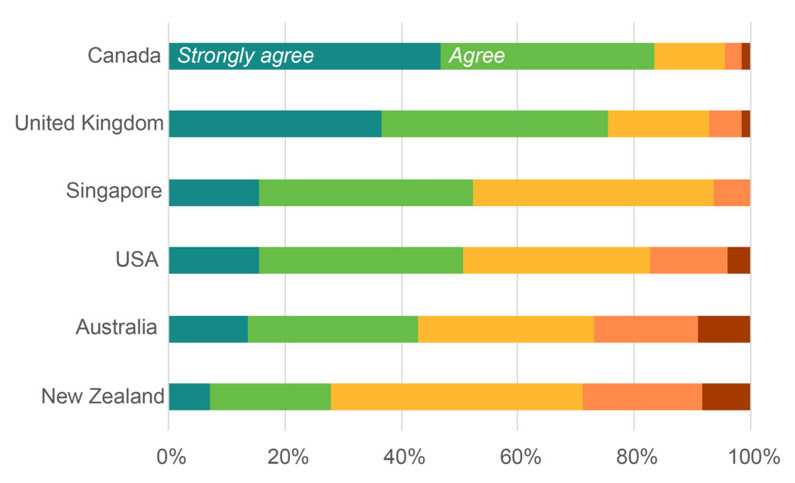COVID-19 has accelerated the rise of Singapore as an international education destination

The third (and most recent) round of Navitas Agent Perception Research in March 2021 is the most comprehensive to date, capturing the views and opinions of nearly 900 agents in 73 countries around the world on the impact of COVID-19 on international education.
Singapore’s appeal is underpinned by a myriad of factors
Singapore has long been seen as a contender destination for international study, with the potential to rival the five major anglophone countries. There are a myriad of factors that underpin the island nation’s appeal.
Singapore offers widespread courses with English-medium instruction (EMI) given that English is in fact the de facto lingua franca and main language. It punches above its weight with more than its fair share of highly-ranked domestic and foreign universities. It is geographically central and thoroughly multicultural, multi-ethnic and multi-faith.
Singapore is of course a highly-successful, knowledge-based economy with decades of stable government since independence. All of these factors contribute to an enviable thriving, cosmopolitan environment bundled in a safe, accessible and compact footprint.
It is for good reason Singapore is ranked 20th in the QS Best Student Cities 2019, flanked by New York and Barcelona no less.
Singapore ranked third for handling of COVID-19, fourth for safety and stability, and third for openness
The Navitas survey of agents included questions pertaining to the ten countries within which Navitas operates university partnerships. In addition to the primary anglophone destinations, agents were also asked to provide responses for Singapore, Germany, the Netherlands, UAE and Sri Lanka. Agents were only asked to comment on any countries about which they were sufficiently well-informed.
Although many more agents were able to comment on the likes of Australia and the UK (747 and 687 respondents respectively), the scale of the March 2021 Navitas agent survey provided substantial numbers for destinations like Singapore (274 respondents).
Figure 4.1 shows the relative rankings of the 10 destinations included in the Navitas agent survey on the three key dimensions of the government’s handling of the pandemic, the country’s reputation for being safe and stable, and the country’s reputation for being open and welcoming. The table shows that Singapore performed admirably, third for the handling of COVID-19, fourth for safety and stability, and third for openness.
Figure 4.1: Rankings for handling of COVID-19, safe and stable, and open and welcoming

COVID-19 has led to more interest in Singapore as an education destination
One of the concluding questions in the Navitas agent survey assesses changes in the level of interest in different destinations. The proportion that agree/strongly agree that there has been increased interest in Singapore as an education destination has grown from 41% in September 2020 to 52% in March 2021.
The increasing interest in Singapore is comparable to that of USA (51%), Germany (54%) and Netherlands (49%), and is better than Australia (43%).
Whether or not the current interest in Singapore will be sustained remains to be seen. Interest is particularly strong from China and South East Asia, and less so from South Asia.
In some ways, Singapore’s strong performance during COVID-19 has not been unexpected. As a destination with many branch campuses — for example, the Curtin Singapore campus operated by Navitas — it provides a valuable transitionary option and viable alternative for students intent on studying in places like Australia and New Zealand while those borders remain close. The big question is whether this COVID-inspired uptick in demand will translate to a longer-term shift in international student preferences towards the Lion City.
Figure 4.2: Proportion that agree/strongly agree that there has been more interest in this country as an education destination in the last two months – March 2021

“Singapore has in some ways been here before. Between 2009 and 2011 when Australia temporarily fell out of favour as an international study destination, enrolments in Singapore grew from trimester to trimester. That growth spike burnt brightly and quickly and was not sustained when Australia recovered. The pandemic will pass but perhaps a return to political normalcy will take longer which might give Singapore time to strengthen its foothold.” — Yu-Gin Teo, College Director and Principal of Curtin Singapore.
Read the Executive Summary and download the Navitas Agent Perception Report here.